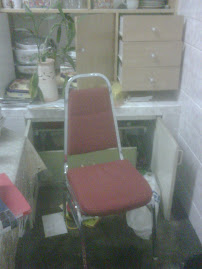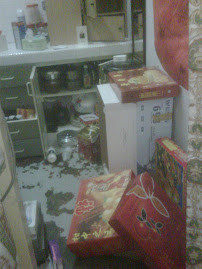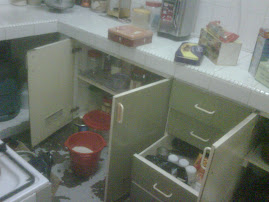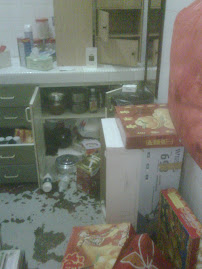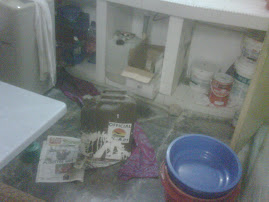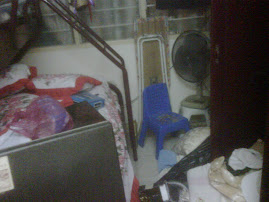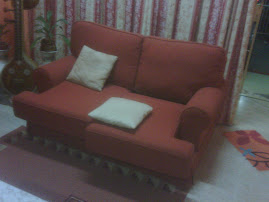HO HUP is confident of getting the support of shareholders for their revised regularisation plan which they feel is the best way to get the company out of its current PN17 status and look towards reviving the company and the business.
The company is proposing a 60 per cent ‘haircut’ as opposed to the 95 per cent ‘haircut’ proposed earlier on June 24, 2009.
Going by their application to Bursa seeking an extension of three months to submit a revised plan taking into consideration additional factor, its managing director Lim Ching Choy, said the proposed reduction of the existing issued and paid-up share capital of the company by RM0.60 of the par value would result in a share consolidation on the basis of five ordinary shares of RM0.40 each into two shares has also been proposed.
“The present board had also proposed a placement of approximately 10 million news shares at an issue price of RM1.00 each and the identities of the placees will be disclosed to shareholders together with a full announcement on the proposed revised scheme, said Lim a statement released today.
The scheme will also see a proposed renounceable rights issue of up to approximately 30 million new shares at an issue price of RM1.00 per revised rights share.
“We are protecting the interests of minority shareholders and we know for a fact that they have been with this company for a long time and appreciate their loyalty and faith in the Ho Hup branding,” added Lim in an apparent response to a reaction by former managing director Dato Low Tuck Choy who was reported saying that he believed that what the current management was proposing was not in the best interests of minority shareholders.
Tuck Choy, through his family’s Low Chee & Sons Sdn Bhd’s holding and other direct stakes, controls about 27% of Ho Hup shares.
He had called for an EGM on Feb 4 to remove seven of eight existing Ho Hup directors, including executive deputy chairman Datuk Vincent Lye and managing director Lim Ching Choy.
Tuck Choy is not offering himself to be re-elected, but had proposed six appointees whom he described as “good, capable and experienced candidates” as replacements.
He said his younger brother, currently Ho Hup non-executive director Low Teik Kein, would remain on board as Low Chee & Sons’ representative.
However Lim said the present state of affairs of Ho Hup was very much due to mismanagement during the tenure of Datuk Low from 1994 till 2008.
“At the time of his exit the share price was at RM0.30 and it was based on that share price that a bigger capital reduction of 95 per cent was initially proposed.
“But the share price had since improved indicating that shareholders have gained confidence in the present management in reviving this 50–year old company that was declared a PN17 company with Bursa in July of 2008.”
Explaining the regularization plan further, Lim said the lower capital reduction this time round comes with the option to leverage on the company’s current 60-acre land bank which they have earmarked to develop Jalil Green City.
This will see a proposed reduction of the existing issued and paid-up share capital of the company by RM0.60 of the par value. A share consolidation on the basis of five ordinary shares of RM0.40 each into two shares has also been proposed.
This would mean that it would either be a 60 per cent capital reduction with the said parameters or a core land bank transaction in the event the proposed revised capital reconstruction is unsuccessful.
This means that the shareholders on Feb 4 will have two options and can vote either vote for the capital reduction or vote for the company to leverage on its core land bank to address the accumulated losses of the Ho Hup Group with certainty in Lim’s plan to bail out Ho Hup.
Lim’s two-pronged approach comes with a back-up plan in which the land bank transaction can be with arrangements to jointly develop the core land bank where the company can either enter into an option to secure buyers for the development projects within the land bank or a combination of the two.
“In essence, the new plan will see a lower amount of restricted shares indicatively to 10 million and a higher quantum of rights shares to indicatively 30 million shares.
Lim also refutes the possibility of a new substantial shareholder coming in with the proposed capital reduction with the rights and shares’ sale and he has clarified that the proposed private placement will be placed to both strategic and non-strategic investors.
“The selection criteria will take into consideration that they must add value to the operations of the Group and this can be done only if the investor understands or is familiar with Ho Hup’s business of property development and construction business and above all the financial viability of the projects.
The surge in the share price was among the key factors that had prompted Lim’s team to rethink their capital reduction footing and deciding on a 60 per cent ‘haircut’ as opposed to the earlier 95 per cent.
Nonetheless Lim continues to be firm with the fact that all the existing shareholders will remain as shareholders, assuming they subscribe, and the details of the proposed private placement will be made known by the board.
Lim has also assured that none of the placees are going to be parties related to the current major shareholders or Ho Hup directors.
On Dato Low’s alternative plan, Lim said that it would not fulfill the basic fundamental requirements for the upliftment of the PN17 status of Ho Hup.
Dato Low had claimed that a regularisation could be done without a capital reduction and had proposed an alternate plan which called for a renounceable one-for-one rights issue of 25.5 million irredeemable convertible preference shares (ICPS) with two warrants for each ICPS subscribed.
Lim said that this was because the amount of funding to be raised (RM25.5 million) is insufficient for Ho Hup’s debt management and working capital especially for the development of the 60 acres.
Moreover Lim feels that there is no guarantee that the free warrants will be exercised in the near future and hence has deemed the cash flow of RM51 million arising from such an exercise, as highly uncertain. This means that with insufficient funding, uncertainties will continue to plague Ho Hup’s continued operations as a growing concern as its current potential renders the company to remain as a PN17 company. This is bearing in mind that the Group had recently secured a loan for RM125 million to refinance its current loan to CIMB and can risk the foreclosure of its land bank in the absence of alternative funding.
Lim is also of the opinion that since any restructuring of a PN17 company has to ensure that the shareholders’ equity has to be more than 25 per cent of the share capital or the shareholders’ capital has to be RM40 million or more, Low’s alternative plan will not be able to fulfill such an obligation.
On Dato Low’s stand that he had asked to be served, Lim said that investigations by the authorities and the police were on-going since police reports have been lodged and a legal suit had been filed against Dato Low for RM250 million.
The company went under accumulating looses amounting to RM270 million over the 14 years of his tenure and we are very much focused on not only reviving the company but moving forward with new businesses as shareholders want returns on their investments.
We have tried to engage Dato Low on several occasions for discussions and had even written to him but he did not respond except for his statements reported by the media.
Wednesday, January 27, 2010
THE 'THIRD FORCE' - THE HO HUP SAGA CONTINUES
Ho Hup has been queried by the authorities as to whether there is a party or parties acting in concert with Low Chee & Sons Sdn Bhd and Choo Soo Har with regards to a purported acquisition of 51 per cent shares in the tussle-ridden Construction and Development giant.
Ho Hup today confirmed that it had indeed received a query from the Securities Commission dated Jan 13 seeking information by engaging section 33A(4) of the Securities Commission Act 1993 and further asking for the current shareholding of Low Chee & Sons, Soo Har and their parties-acting-in-concert.
While Ho Hup does not dismiss the possibility of a “third force” acting in concert on the sidelines in the run-up to the Feb 4 EGM called by the former managing director Dato Low Tuck Choy, it becomes more apparent especially with the market surge that has created a lot of hype in the market.
Fuelled by the tussle between the two opposing shareholders the deputy chairman of Ho Hup Datuk Vincent Lye and Dato Low, the ‘third force’ appears to be preparing a coup come Feb 4 where a 51 per cent vote on the part of shareholders would be sought to determine the direction in which the company is going to take.
However things do not seem to add up in the Low Chee & Sons’ stable where one of the three siblings Low Teik Kien, the current executive director of Ho Hup and younger brother of the ousted former boss Tuck Choy and another sibling Ms Low Lai Yoong, do not seem to be seeing eye-to-eye on matters of Ho Hup and Low Chee & Sons.
This reality is heightened by Low Teik Kien’s function in the present board having endorsed the course of actions and measures taken by the current management in the interest of Ho Hup while Dato Low appears to be using Low Chee & Sons to oppose Ho Hup’s actions.
It is reliably learnt the siblings prefer to part ways as the Ho Hup tussle deepens what with police reports and a RM250 million legal action against Tuck Choy becoming a blemish on the family’s good name in the business.
The surge in the share price on the other hand had prompted the present management led by its managing director Lim Ching Choy to seek a postponement of their restructuring plan having proposed a new revised downward the capital reduction from 95 per cent to 60 per cent as a bail-out solution for Ho Hup. The bail-out is needed given the current PN17 status of Ho Hup.
While market observers are wondering whether the company’s share is really worth its current trading price of RM1.19. The share price had tumbled to an all time low of RM24
sen previously. Over the past one month, the share priced had peaked to RM2.08 with trading volumes increasing in unusual market action (UMA).
This prompted Bursa to query Ho Hup on Jan 5 this year requesting for an immediate confirmation on whether there was any corporate development relating to Ho Hup Group’s business affairs and that had not been previously announced. This was to explain the causes of the unusual market activity for a PN17 status company.
The question remains whether a ‘third force’ can stay intact with what appears to be rivalry among the siblings in Low Chee & Sons to topple the present management seeking a mandate to revive the company, said a market insider.
The market insider went on to question whether the EGM being called on Feb 4 was an action that was being taken after the intervention of the ‘third force’ in what has been estimated as RM70 million worth of shares changing hands in the UMA. “There is great value to be harnessed in Ho Hup especially with its 60-acre land bank in a prime location in Bukit Jalil which the present management has earmarked to develop into Jalil Green City,” said the insider.
This has raised eyebrows among old faithful loyalist minority shareholders and potential shareholders who may prefer to place their odds on Lim’s management team to get Ho Hup out of this debacle and head towards not only revival and sustainability but also profitability.
Market analysts who speculated when the share price peaked when investors started buying up to take sides in the tussle only add credence to the existence of the ‘third force’ now in the form of an unseen hand to try and garner support by buying huge volumes of shares to tilt the odds in favour of Tuck Choy.
Either by sheer coincidence or by choice, market analysts had already spotted an irony in the line-up of six directors proposed by Dato Low in the form Tan Sri Kamaruzzaman Sharif who happens to be the former chairman of Magna Bhd. The other directors proposed are Hew Thin Chay, Yusob Md Tasir, Felix Dorairaj, Slamat Manzah and Chow Seck Wai. They have also raised questions whether there is a concert of sorts between Low Chee & Sons and Magna Prima in what Dato Low is attempting to shape up.
The present directors of Ho Hup including Lim are Datuk Liew Lee Leong, Lai Moo Chan, Long Md Nor Amran Long Ibrahim, Mohd Shahril Tan Sri Hamzah and Foo Ton Hin.
Tuck Choy’s 3 per cent share together with Low Chee & Sons’ 22.66 per cent with Choo Soo Har’s 2 per cent give this grouping an almost 26 per cent shareholding against Datuk Vincent’s 27.95 held via his company Extreme Systems Sdn Bhd.
Undoubtedly there are worries that the share, which has earned the recognition of being one of the best performing stocks on Bursa during these periods, was being overbought, said a market analyst.
But the analyst went on to forecast that shareholders would align themselves with a group which can deliver and given the chain of events surrounding Ho Hup in the last 15 months since Datuk Vincent came into the picture and Lim making his repairs for a makeover, they would prefer the company to settle down with the ones who can deliver.
When this is placed against the scenario in which this 50-year old company collapsed over a period of the last seven years from 2001 to 2008 when the company suffered accumulated losses amounting to RM270 million, it will be quite obvious on which side the minority shareholders will bank their support regardless of whether a third force is in play.
Ho Hup today confirmed that it had indeed received a query from the Securities Commission dated Jan 13 seeking information by engaging section 33A(4) of the Securities Commission Act 1993 and further asking for the current shareholding of Low Chee & Sons, Soo Har and their parties-acting-in-concert.
While Ho Hup does not dismiss the possibility of a “third force” acting in concert on the sidelines in the run-up to the Feb 4 EGM called by the former managing director Dato Low Tuck Choy, it becomes more apparent especially with the market surge that has created a lot of hype in the market.
Fuelled by the tussle between the two opposing shareholders the deputy chairman of Ho Hup Datuk Vincent Lye and Dato Low, the ‘third force’ appears to be preparing a coup come Feb 4 where a 51 per cent vote on the part of shareholders would be sought to determine the direction in which the company is going to take.
However things do not seem to add up in the Low Chee & Sons’ stable where one of the three siblings Low Teik Kien, the current executive director of Ho Hup and younger brother of the ousted former boss Tuck Choy and another sibling Ms Low Lai Yoong, do not seem to be seeing eye-to-eye on matters of Ho Hup and Low Chee & Sons.
This reality is heightened by Low Teik Kien’s function in the present board having endorsed the course of actions and measures taken by the current management in the interest of Ho Hup while Dato Low appears to be using Low Chee & Sons to oppose Ho Hup’s actions.
It is reliably learnt the siblings prefer to part ways as the Ho Hup tussle deepens what with police reports and a RM250 million legal action against Tuck Choy becoming a blemish on the family’s good name in the business.
The surge in the share price on the other hand had prompted the present management led by its managing director Lim Ching Choy to seek a postponement of their restructuring plan having proposed a new revised downward the capital reduction from 95 per cent to 60 per cent as a bail-out solution for Ho Hup. The bail-out is needed given the current PN17 status of Ho Hup.
While market observers are wondering whether the company’s share is really worth its current trading price of RM1.19. The share price had tumbled to an all time low of RM24
sen previously. Over the past one month, the share priced had peaked to RM2.08 with trading volumes increasing in unusual market action (UMA).
This prompted Bursa to query Ho Hup on Jan 5 this year requesting for an immediate confirmation on whether there was any corporate development relating to Ho Hup Group’s business affairs and that had not been previously announced. This was to explain the causes of the unusual market activity for a PN17 status company.
The question remains whether a ‘third force’ can stay intact with what appears to be rivalry among the siblings in Low Chee & Sons to topple the present management seeking a mandate to revive the company, said a market insider.
The market insider went on to question whether the EGM being called on Feb 4 was an action that was being taken after the intervention of the ‘third force’ in what has been estimated as RM70 million worth of shares changing hands in the UMA. “There is great value to be harnessed in Ho Hup especially with its 60-acre land bank in a prime location in Bukit Jalil which the present management has earmarked to develop into Jalil Green City,” said the insider.
This has raised eyebrows among old faithful loyalist minority shareholders and potential shareholders who may prefer to place their odds on Lim’s management team to get Ho Hup out of this debacle and head towards not only revival and sustainability but also profitability.
Market analysts who speculated when the share price peaked when investors started buying up to take sides in the tussle only add credence to the existence of the ‘third force’ now in the form of an unseen hand to try and garner support by buying huge volumes of shares to tilt the odds in favour of Tuck Choy.
Either by sheer coincidence or by choice, market analysts had already spotted an irony in the line-up of six directors proposed by Dato Low in the form Tan Sri Kamaruzzaman Sharif who happens to be the former chairman of Magna Bhd. The other directors proposed are Hew Thin Chay, Yusob Md Tasir, Felix Dorairaj, Slamat Manzah and Chow Seck Wai. They have also raised questions whether there is a concert of sorts between Low Chee & Sons and Magna Prima in what Dato Low is attempting to shape up.
The present directors of Ho Hup including Lim are Datuk Liew Lee Leong, Lai Moo Chan, Long Md Nor Amran Long Ibrahim, Mohd Shahril Tan Sri Hamzah and Foo Ton Hin.
Tuck Choy’s 3 per cent share together with Low Chee & Sons’ 22.66 per cent with Choo Soo Har’s 2 per cent give this grouping an almost 26 per cent shareholding against Datuk Vincent’s 27.95 held via his company Extreme Systems Sdn Bhd.
Undoubtedly there are worries that the share, which has earned the recognition of being one of the best performing stocks on Bursa during these periods, was being overbought, said a market analyst.
But the analyst went on to forecast that shareholders would align themselves with a group which can deliver and given the chain of events surrounding Ho Hup in the last 15 months since Datuk Vincent came into the picture and Lim making his repairs for a makeover, they would prefer the company to settle down with the ones who can deliver.
When this is placed against the scenario in which this 50-year old company collapsed over a period of the last seven years from 2001 to 2008 when the company suffered accumulated losses amounting to RM270 million, it will be quite obvious on which side the minority shareholders will bank their support regardless of whether a third force is in play.
Tuesday, January 26, 2010
THE HO HUP TUSSLE
THE market place is abuzz with speculations on what will be the outcome of the Feb 4 extraordinary general meeting of Ho Hup Construction Berhad which will most likely see the company making a turning point in its 50-year history.
One the one hand we have seen the present board of directors led by corporate maverick Lim Ching Choy who is doing the best he can to keep the ship afloat by drawing on the company’s strength and overcoming its weaknesses. Lim is the appointee of the new deputy executive chairman Datuk Vincent Lye Ek Seang who made his sudden entry into the company as a major shareholder in 2008.
On the other hand, we see a renegade former managing director in the form of Dato Low Tuck Choy, heir apparent to the Ho Hup business empire founded in 1960 by the late Low Chee, in a bid to make a re-entry and conduct business his way as a son of founder Low Chee.
We see the present board steering the company out of its past shadow of mismanagement and doing everything it can to put things in order not only to revive the company but to give it a living process with a sustainable growth to look forward to, it needs the support of the shareholders. The stage is set for what appears to be a tussle.
Ho Hup’s future has come into question as a result of this tussle which erupted in August 2008 with the suspension of Dato Loy over irregularities uncovered by the company’s audit committee.
The company was set up by Low Chee in the 60s. He was in fact, the driving force behind its development seeing it grow and expand and get involved in various fields of building and civil engineering works. A number of government and private sector projects were successfully completed. Very few public listed construction and development companies can boast such a history.
From figures obtained, the success of the company began to raise eyebrows from 1987 when it started chalking pre-tax profits from RM4 million and went on an upward trend from 1989 from RM8million to settle at RM35million in 1993. The company was listed on the main board of the Kuala Lumpur Stock Exchange (KLSE) on Sept 11, 1991.
It was during that period in 1993 that Ho Hup made headlines for a different reason when it volunteered 80 of its workers and equipment to clear fallen debris during the Highland Towers tragedy.
Shortly after that in 1994, Low Chee passed away and the reins of the company were picked up by Datuk Low who was appointed managing director of Ho Hup. Low continued to head the board in that capacity for the next 14 years during which time the earnings of the company escalated to RM58millon in 1996 riding on secured commitments. This was before everything changed in the company.
From one of the healthiest construction groups in the Malaysian construction and development scenario alongside other similar greats at the time like YTL, Road Builder and UEM to name a few, Ho Hup started to fumble and tumble following a number of project mishaps. The present board of directors is zooming in on them after having identified them to be the direct result of management weaknesses and shortcomings in what could eventually become a mismanagement case study.
To be specific there were project delays which Ho Hup had to pay the price for namely Phases 4,5 and 6 of the Jalil Sutera property development in Bukit Jalil which was carried out in 2003 by its subsidiary Ho Hup Development Sdn Bhd. The project which boasted 225 units of houses in seven phases with a gross development value of RM 162 million came to a standstill in 2006.
Fuming purchasers were up in arms and marched to the Housing Ministry to lodge their dissatisfaction and the company had to fork out liquidated ascertained damages (LAD) claims amounting to RM23 million for the Jalil Sutera project. By then, the company’s balance in the Housing Development Authority (HAD) fund had dwindled to RM2,410.66 as at Jan 16, 2008.
It was a dark patch in Ho Hup’s history with purchasers storming their office demanding solutions for delays.
The problems which began to riddle Ho Hup did not stop there but even went to as far as a Madagascar for which a number of key decisions were made without consulting the board of directors, the most glaring of which was the USD60 million road development project which was awarded by the Madagascar Government in 2004.
The project was unilaterally terminated in 2006 following which USD40 million (RM140 million) worth of machineries were seized by the Madagascar Government after slapping Ho Hup with RM42million (RM147 million) lawsuit which was hauled up for arbitrators. This was in fact one of the biggest cancerin the Ho Hup Group.
Plagued with these occurrences, Ho Hup started falling back and defaulting in payments due to agencies the Employees’ Provident Fund (EPF) and the Inland Revenue Department. It is reliably learnt that prior to July 2008, scheduled tax deductions of RM743,027, EPF contributions amounting to RM1.3 million and Socso charges totaling RM138,000 were left unpaid.
This is coupled with the fact that the company had also failed to pay up its RM6.6 million for the assessment period 2000 and 2005 excluding tax penalties of RM1.1 million.
With such liabilities in tow, Ho Hup collapsed into the red from the year 2000 recording losses from RM20 million in 2001 till RM58 million in 2008 and share prices crumbled from an all time high of RM8.15 in the hey days back in 1993 from its opening price o f RM3 in 1991 to RM0.30 at the end of 2008.
Matters came to a head-on when an unauthorised land transaction 50 per cent below the market price in addition to the dubious cash payments and the shipping abroad of the RM40 million worth of heavy machinery were among the wrongdoings picked up by Ho Hup’s audit committee. They went on to report these wrongdoings to the police, Bursa and Securities Commission in a statement released by the Board of Directors of Ho Hup on January 18, this year.
It was seen as a move to set the records straight in the tussle-ridden Ho Hup of late. The board of directors in a meeting held on Jan 15 had decided to pursue action based on the final investigative report on several acts of breach of duties which had resulted in RM236 million in losses to the company.
The land transaction was the result of a joint-venture agreement signed in 2008 involving Dato Low in which Bukit Jalil Development Sdn Bhd (BJDSB) would receive RM14.5million over a period of three years whereas the variation report from the independent valuer is RM28 million.
Dato Low, according to Ho Hup’s report to Bursa, had accepted RM1.2 million as a deposit from YTL subsidiary – Syarikat Kemajuan Perumahan Negara Sdn Bhd (SKPN) without the approval of both the boards of directors of Ho Hup and BJDSB respectively.
Hop Hup and UEM’s equity base in BJDSB was at that time 70 per cent and 30 per cent respectively.
A director of (BJDSB) Felix Dorairash is also reported to have acted as the lawyer for both sides in the transaction of the 16-acre plot of land which was valued at the time at RM28million.
However without terminating the transaction Low is reported to have had banked in a two per cent earnest fee from Bukit Pekeliling SDN Bhd and Hang Fong Property Sdn Bhd on the same piece of land.
This was when an executive committee was appointed on Aug 15, 2008 and a proposal was made to sell off the land at RM29 million with a RM10 million deposit instead to raise capital for an ailing Ho Hup.
The sale was however called off due the existence of three caveats on the said plot of land.
When Bukit Jalil Development Sdn Bhd (BJDSB) finally sold the land (five acres to Santari and 11 acres to Permatang Juang) Low openly opposed it in a subsequent EGM and filed suits against Ho Hup, (BJDSB), Santari, Permatang Juang and Magna Prima in middle of last year.
A police report was lodged in Aug last year against Low following which 30 witnesses had been called to give statements by Commercial Crimes in Bukit Aman. However Dato Low took everyone by surprise and withdrew all legal action at the end of last year, the reasons for which continues to remain a mystery to Ho Hup shareholders.
The state of affairs in Ho Hup has resulted in the company being declared a PN17 company on July 28, 2008.
A subsequent board meeting of Aug 28, 2008, saw the debut of Datuk Vincent Lye, with his acquisition of 27.95 per cent shares via his company Extreme Systems Sdn Bhd. He thus became a major force in Ho Hup. He went on to head an executive committee which was set up to assist the managing director in decision making processes, a move which eventually saw the exit of Dato Low.
Dato Low went on to be suspended after five directors voted in favour of the decision to suspend him as worries mounted as to the fate of company and the direction it was heading.
The suspension was done on the grounds among others, that certain breaches of fudiciary duties had been committed which had caused substantial business losses to Ho Hup.
In tandem with the suspension an audit firm Anuarul Azizan Chew & Co was appointed to undertake a comprehensive investigative audit of all business losses suffered by Ho Hup and its subsidiary and associated companies for a period of six years from Dec 31 2002 till Dec 31, 2008.
Subsequently Low failed to be re-elected as the Company’s director at the Company’s annual general meeting of shareholders held on Oct 23, 2008. The Board of Directors in their written statement to Bursa, cited several instances in which cash payments amounting to RM5.15 million were made without the board’s approval for various dubious purposes which had been authorised by Low.
These payments include ‘promoter fees’ made for one ‘Perlin Mandeera Project’ in Sri Lanka and excessive progress payments amounting to RM11,260,755.25 made in Phases 1 to 6 and 7A of the Jalil Sutera Project of 193 units of shop lots. The company had to also fork out late delivery compensation charges of liquidated ascertained damages (LAD) and finance charges to the tune of RM23 million. This resulted in their HDA fund amounting to RM996 being frozen by the Housing Ministry on October 2008.
Page 6
Payments made were not supported by any document and far exceeded the original contract construction sum.
The statement also cited the questionable appointment of a certain tax agent and payment of that tax agent’s ‘fees’ amounting to RM110,000 when there was no evidence of any work done by the tax agent. Post-dated cheques amounting to RM1.6 million were paid to the tax agent.
It was also reported that company machinery valued at RM41.8 million was also shipped to Madagascar for the ‘Madagascar Highway Project’ without the board’s approval besides the company having had spent RM8.3 million in construction costs in the ‘NAS Pavilion Project’ for which only RM2.5 million was received and entered into by the company account .
The company lost RM995,000 from the sale of the company’s machineries without an independent valuation to only one particular buyer which is a sole proprietor, by the name of Concept Business. This was also done without obtaining the board’s approval.
The investigation was also to ascertain whether there was any violation of law, fraud, breach of duty and negligence during that by both the group and company’s previous directors as well as by other third parties.
The board accepted the investigative accountants’ first report after it had been considered by the company’s audit committee and had directed a police report to be lodged by the company’s management.
The company has since been giving its full co-operation and liaising closely with the appropriate authorities in relation to the police report.
The investigative accountants’ second report comprised a detailed analysis as well as findings and is supported by extensive documentary evidence.
Subsequently, the investigative accountants’ second report has confirmed that there was reasonable suspicion and that various offences of criminal breaches of trust, misappropriation of property and cheating under sections 409, 403 and 420 of the Penal Code respectively had been committed against the Ho Hup Group of Companies.
It was also found that various breaches of director’s duties under section 132 of the Companies’ Act 1965 had also been committed. In its report to Bursa, Ho Hup stipulated that the Penal Code Breaches and the Companies Act Breaches over the six year period had resulted in the company losing RM236 million.
In the latest meeting held on Jan 15, 2010, the board went on to accept the second report and had directed to lodge the police report and subsequently reported to the Securities Commission and Bursa Malaysia Securities Bhd.
Datuk Vincent and his committee went on to appoint Lim as managing director in June 2009 and he is now the architect of this corporate makeover of Ho Hup.
Lim swung into action and took broad view of the company and started a number of measures which resulted in the share price rising from RM0.30 to the current average of RM1.40.
Lim managed to secure a new credit facility of RM125million during the financial year ended December 31, 2009 of which RM75 million was utilised for working capital purposes in respect of the development of its 60 acre land bank in Bukit Jalil.
It was to part-finance the payment of certain liabilities to Ho Hup’s creditors and liquidate ascertained damages. The credit facility would also be able to refinance the company current loan with CIMB Bank Berhad to which the 60 acreas of land had been charged.
The new management team is headed by Lim and comprises Datuk Liew Lee Leong, Lai Moo Chan, Long Md Nor Amran Long Ibrahim, Mohd Shahril Tan Sri Hamzah and Foo Ton Hin in what is perceived as a good mix of legal and accounting personalities with substantial corporate experience.
Drawing on the strength of this team, Lim went on to negotiate with bankers to restructure its outstanding loans which involves extending the repayment period of the loans, refinancing certain loans with funding from new sources and also to repay its borrowings by disposing non-core land banks. The company fell back with outstanding loans amounting to RM95.74 million from CIMB (RM78.85 m), Alliance Investment Bank (RM3.26m), RHB (RM2.53m), Maybank (RM8.24m) and UOB (RM2.86m).
Lim went on to propose to the board on June 24, last year that a regularisation plan was necessary after taking into account feedback from Bursa Securities and the Securities Commission. In the meantime, the board was convinced that mismanagement was the main cause of Ho Hup’s losses and made a unanimous decision to file a RM250 million suit against Datuk Low following police reports lodged to that effect.
Lim proposed a 95 per cent capital reduction to eliminate outstanding accumulated losses on the company’s balance sheet and to facilitate future fund-raising exercises of the company. The substantial haircut was found necessary in order to ensure that the company would be able to start on a firmer footing following the restructuring exercise as otherwise any future profits to be made would sink into wiping out accumulated losses with no dividends being paid out.
The capital reduction amount of 95 per cent reflected the Group’s current net assets value. A restricted issue and rights issue was also proposed to replenish the Group’s capital via a fresh injection of funds with Datuk Vincent’s Extreme Systems giving an undertaking to subscribe for its entitlement under the proposed rights issue and those not taken up by other shareholders of Ho Hup.
The Board had also decided on a larger restricted issue of 26.25 million new shares at an issue price of RM1.00 and a rights issue of 12.75 Rights Shares at an issued priced of RM1.00 in order to meet the minimum post restricting shareholders’ equity requirement for PN 17 companies of RM40million.
It is common place for a PN17 company to undergo a restructuring exercise to reduce its accumulated losses.
This move met with resistance from Datuk Low who argued that the regularisation could be done without capital reduction and he went on to make known an alternative plan which would call for a renounceable one–for-one rights issue of RM25.5 million irredeemable convertible preference shares (ICPS) with two warrants for each ICPS subscribed.
On January 7 this year, Datuk Low proposed his alternative plan to the regulators. He is now seen as a force opposing the current board. Datuk Low represents a 25.96 stake in the company via family-owned Low Chee & Sons (LCS) in which he himself owns a three per cent and teamed up with minority shareholder in the form of retiree Choo Sor Har who holds a two per cent stake.
On Jan 5 this year, Datuk Low in a special notice to Bursa cited Sections 128 and 153 of the Companies’ Act 1965 called for the removal of the current board and the appointment of a new board.
Since then, shareholders have reacted in one way or the other to both the regularisation plans which is expected to be voted on as well in the extraordinary general meeting scheduled for Feb 4. Taking the cue from the shareholders, Lim had submitted to Bursa on Jan 22 for an extension to relook at its proposals to regularise the financial condition.
Lim felt that although the initial proposed regularisation plan was sufficiently comprehensive to uplift Ho Hup’s PN17 status, the board had during several subsequent meetings deliberated on the concerns received from the shareholders.
This resulted in a revised regularisation scheme which will see a higher participation by existing shareholders in the rights issue and a lower amount of restricted issue shares to investors.
The present board is now proposing a placement of approximately 10 million news shares at an issue price of RM1.00 each and the identities present management has pledged that the identities of the placees will be disclosed to shareholders together with a full announcement on the proposed revised scheme.
The scheme will also see a proposed renounceable rights issue of up to approximately 30 million new shares at an issue price of RM1.00 per revised rights share.
The lower capital reduction comes with the option to leverage on the company’s current 60-acre land bank which they have earmarked to develop Jalil Green City.
This will see a proposed reduction of the existing issued and paid-up share capital of the company by RM0.60 of the par value. A share consolidation on the basis of five ordinary shares of RM0.40 each into two shares has also been proposed.
This would mean that it would either be a 60 per cent capital reduction with the said parameters or a core land bank transaction in the event the proposed revised capital reconstruction is unsuccessful.
The shareholders on Feb 4 will have the option to either vote for the capital reduction or vote for the company to leverage on its core land bank to address the accumulated losses of the Ho Hup Group with certainty in Lim’s plan to bail out Ho Hup.
Lim’s two-pronged approach comes with a back-up plan in which the land bank transaction can be with arrangements to jointly develop the core land bank where the company can either enter into an option to secure buyers for the development projects within the land bank or a combination of the two. In essence, the new plan will see a lower amount of restricted shares indicatively to 10 million and a higher quantum of rights shares to indicatively 30 million shares.
Lim refutes the possibility of a new substantial shareholder coming in with the proposed capital reduction with the rights and shares’ sale and he has clarified that the proposed private placement will be placed to both strategic and non-strategic investors. The selection criteria will take into consideration that they must add value to the operations of the Group and this can be done only if the investor understands or is familiar with Ho Hup’s business of property development and construction business and above all the financial viability of the projects.
With all the attention Ho Hup is gaining with what is seen as an open tussle for the company, Bursa recorded an UMA (unusual market activity) especially from Dec 31, 2009 when its share price closed at Rm0.88 till Jan 9, 2010 when it closed RM1.99. It has since averaged at RM1.38.
Have opportunities arisen in this crisis and are there parties concerned moving in with majority shareholders of Ho Hup are some of the questions crossing the minds of not only market watchers but also the minority shareholders who will be the deciding factor.
The sudden surge in the share price has also prompted Lim’s team to rethink their capital reduction footing and deciding on a 60 per cent ‘haircut’ as opposed to the earlier 95 per cent.
Nonetheless Lim continues to be firm with the fact that all the existing shareholders will remain as shareholders, assuming they subscribe, and the details of the proposed private placement will be made known by the board.
Lim has also assured that none of the placees are going to be parties related to the current major shareholders or Ho Hup directors.
Lim feels that the alternative plan proposed by Datuk Low will not fulfill the basic fundamental requirements for the upliftment of the PN17 status of Ho Hup. This is because the amount of funding to be raised (RM25.5 million) is insufficient for Ho Hup’s debt management and working capital especially for the development of the 60 acres.
Moreover Lim feels that there is no guarantee that the free warrants will be exercised in the near future and hence has deemed the cash flow of RM51 million arising from such an exercise, as highly uncertain. This means that with insufficient funding, uncertainties will continue to plague Ho Hup’s continued operations as a growing concern as its current potential renders the company to remain as a PN17 company. This is bearing in mind that the Group had recently secured a loan for RM125 million to refinance its current loan to CIMB and can risk the foreclosure of its land bank in the absence of alternative funding.
Lim is also of the opinion that since any restructuring of a PN17 company has to ensure that the shareholders’ equity has to be more than 25 per cent of the share capital or the shareholders’ capital has to be RM40 million or more, Low’s alternative plan will not be able to fulfill such an obligation.
Come Feb 4, when it will be the day of reckoning for Ho Hup, shareholders will be carrying out two tasks. In a nutshell, if the shareholders vote in favour of the present board’s regularisation plan, Ho Hup comes out of its PN17 status and the company can move forward with a stronger financial position.
This will be made possible after having cleaned up the company’s balance sheet while also addressing the immediate cash flow to continue development of Jalil Green City while also addressing the concerns of shareholders.
Page 13
If shareholders chose to vote in Datuk Low’s regularisation plan, the root problems of the balance sheet will remain unsolved and there will be insufficient funds to continue business to provide a steady income and a return of investments (ROI) for shareholders. Notwithstanding this, hardly any investment bank would be willing to underwrite Ho Hup’s proposed rights’ issue given the company’s ailing condition.
While the decision to take is clearer now than ever before, Ho Hup has to continue to grow to match if not be at par with its peers. Ho Hup has a strong history spanning 50 years and could have been at par with the likes of IJM, Gamuda and Ireka to name a few. Unfortunately due its mismanagement, it is now a PN17 company awaiting a new lease of life with the proposed regularisation plan to be approved by the regulators before it is voted on come Feb 4.
In moving forward, the present board has already lined up its projections based on projects to be carried out on its land bank of 60 acres. The development will include a mixed and residential development - Jalil Green City and expects to launch its five and eight-storey high signature offices in the first quarter of 2010.
In the immediate term however, the company’s revenue will be largely derived from its property development projects especially the remaining phases of Jalil Sutera in its Phase 7B as well as the first phase of development of the 60-acre land parcel which is expected to contribute to the company’s revenue from the second quarter of the financial year ending December 31.
The proposed Jalil Green City boasts an estimated gross development value of RM1.6 billion and a development tenure spanning eight years from 2010. This is expected to spearhead Ho Hup’s profitability in the future. With all the corporate brouhaha Ho Hup will be a counter to watch closely.
One the one hand we have seen the present board of directors led by corporate maverick Lim Ching Choy who is doing the best he can to keep the ship afloat by drawing on the company’s strength and overcoming its weaknesses. Lim is the appointee of the new deputy executive chairman Datuk Vincent Lye Ek Seang who made his sudden entry into the company as a major shareholder in 2008.
On the other hand, we see a renegade former managing director in the form of Dato Low Tuck Choy, heir apparent to the Ho Hup business empire founded in 1960 by the late Low Chee, in a bid to make a re-entry and conduct business his way as a son of founder Low Chee.
We see the present board steering the company out of its past shadow of mismanagement and doing everything it can to put things in order not only to revive the company but to give it a living process with a sustainable growth to look forward to, it needs the support of the shareholders. The stage is set for what appears to be a tussle.
Ho Hup’s future has come into question as a result of this tussle which erupted in August 2008 with the suspension of Dato Loy over irregularities uncovered by the company’s audit committee.
The company was set up by Low Chee in the 60s. He was in fact, the driving force behind its development seeing it grow and expand and get involved in various fields of building and civil engineering works. A number of government and private sector projects were successfully completed. Very few public listed construction and development companies can boast such a history.
From figures obtained, the success of the company began to raise eyebrows from 1987 when it started chalking pre-tax profits from RM4 million and went on an upward trend from 1989 from RM8million to settle at RM35million in 1993. The company was listed on the main board of the Kuala Lumpur Stock Exchange (KLSE) on Sept 11, 1991.
It was during that period in 1993 that Ho Hup made headlines for a different reason when it volunteered 80 of its workers and equipment to clear fallen debris during the Highland Towers tragedy.
Shortly after that in 1994, Low Chee passed away and the reins of the company were picked up by Datuk Low who was appointed managing director of Ho Hup. Low continued to head the board in that capacity for the next 14 years during which time the earnings of the company escalated to RM58millon in 1996 riding on secured commitments. This was before everything changed in the company.
From one of the healthiest construction groups in the Malaysian construction and development scenario alongside other similar greats at the time like YTL, Road Builder and UEM to name a few, Ho Hup started to fumble and tumble following a number of project mishaps. The present board of directors is zooming in on them after having identified them to be the direct result of management weaknesses and shortcomings in what could eventually become a mismanagement case study.
To be specific there were project delays which Ho Hup had to pay the price for namely Phases 4,5 and 6 of the Jalil Sutera property development in Bukit Jalil which was carried out in 2003 by its subsidiary Ho Hup Development Sdn Bhd. The project which boasted 225 units of houses in seven phases with a gross development value of RM 162 million came to a standstill in 2006.
Fuming purchasers were up in arms and marched to the Housing Ministry to lodge their dissatisfaction and the company had to fork out liquidated ascertained damages (LAD) claims amounting to RM23 million for the Jalil Sutera project. By then, the company’s balance in the Housing Development Authority (HAD) fund had dwindled to RM2,410.66 as at Jan 16, 2008.
It was a dark patch in Ho Hup’s history with purchasers storming their office demanding solutions for delays.
The problems which began to riddle Ho Hup did not stop there but even went to as far as a Madagascar for which a number of key decisions were made without consulting the board of directors, the most glaring of which was the USD60 million road development project which was awarded by the Madagascar Government in 2004.
The project was unilaterally terminated in 2006 following which USD40 million (RM140 million) worth of machineries were seized by the Madagascar Government after slapping Ho Hup with RM42million (RM147 million) lawsuit which was hauled up for arbitrators. This was in fact one of the biggest cancerin the Ho Hup Group.
Plagued with these occurrences, Ho Hup started falling back and defaulting in payments due to agencies the Employees’ Provident Fund (EPF) and the Inland Revenue Department. It is reliably learnt that prior to July 2008, scheduled tax deductions of RM743,027, EPF contributions amounting to RM1.3 million and Socso charges totaling RM138,000 were left unpaid.
This is coupled with the fact that the company had also failed to pay up its RM6.6 million for the assessment period 2000 and 2005 excluding tax penalties of RM1.1 million.
With such liabilities in tow, Ho Hup collapsed into the red from the year 2000 recording losses from RM20 million in 2001 till RM58 million in 2008 and share prices crumbled from an all time high of RM8.15 in the hey days back in 1993 from its opening price o f RM3 in 1991 to RM0.30 at the end of 2008.
Matters came to a head-on when an unauthorised land transaction 50 per cent below the market price in addition to the dubious cash payments and the shipping abroad of the RM40 million worth of heavy machinery were among the wrongdoings picked up by Ho Hup’s audit committee. They went on to report these wrongdoings to the police, Bursa and Securities Commission in a statement released by the Board of Directors of Ho Hup on January 18, this year.
It was seen as a move to set the records straight in the tussle-ridden Ho Hup of late. The board of directors in a meeting held on Jan 15 had decided to pursue action based on the final investigative report on several acts of breach of duties which had resulted in RM236 million in losses to the company.
The land transaction was the result of a joint-venture agreement signed in 2008 involving Dato Low in which Bukit Jalil Development Sdn Bhd (BJDSB) would receive RM14.5million over a period of three years whereas the variation report from the independent valuer is RM28 million.
Dato Low, according to Ho Hup’s report to Bursa, had accepted RM1.2 million as a deposit from YTL subsidiary – Syarikat Kemajuan Perumahan Negara Sdn Bhd (SKPN) without the approval of both the boards of directors of Ho Hup and BJDSB respectively.
Hop Hup and UEM’s equity base in BJDSB was at that time 70 per cent and 30 per cent respectively.
A director of (BJDSB) Felix Dorairash is also reported to have acted as the lawyer for both sides in the transaction of the 16-acre plot of land which was valued at the time at RM28million.
However without terminating the transaction Low is reported to have had banked in a two per cent earnest fee from Bukit Pekeliling SDN Bhd and Hang Fong Property Sdn Bhd on the same piece of land.
This was when an executive committee was appointed on Aug 15, 2008 and a proposal was made to sell off the land at RM29 million with a RM10 million deposit instead to raise capital for an ailing Ho Hup.
The sale was however called off due the existence of three caveats on the said plot of land.
When Bukit Jalil Development Sdn Bhd (BJDSB) finally sold the land (five acres to Santari and 11 acres to Permatang Juang) Low openly opposed it in a subsequent EGM and filed suits against Ho Hup, (BJDSB), Santari, Permatang Juang and Magna Prima in middle of last year.
A police report was lodged in Aug last year against Low following which 30 witnesses had been called to give statements by Commercial Crimes in Bukit Aman. However Dato Low took everyone by surprise and withdrew all legal action at the end of last year, the reasons for which continues to remain a mystery to Ho Hup shareholders.
The state of affairs in Ho Hup has resulted in the company being declared a PN17 company on July 28, 2008.
A subsequent board meeting of Aug 28, 2008, saw the debut of Datuk Vincent Lye, with his acquisition of 27.95 per cent shares via his company Extreme Systems Sdn Bhd. He thus became a major force in Ho Hup. He went on to head an executive committee which was set up to assist the managing director in decision making processes, a move which eventually saw the exit of Dato Low.
Dato Low went on to be suspended after five directors voted in favour of the decision to suspend him as worries mounted as to the fate of company and the direction it was heading.
The suspension was done on the grounds among others, that certain breaches of fudiciary duties had been committed which had caused substantial business losses to Ho Hup.
In tandem with the suspension an audit firm Anuarul Azizan Chew & Co was appointed to undertake a comprehensive investigative audit of all business losses suffered by Ho Hup and its subsidiary and associated companies for a period of six years from Dec 31 2002 till Dec 31, 2008.
Subsequently Low failed to be re-elected as the Company’s director at the Company’s annual general meeting of shareholders held on Oct 23, 2008. The Board of Directors in their written statement to Bursa, cited several instances in which cash payments amounting to RM5.15 million were made without the board’s approval for various dubious purposes which had been authorised by Low.
These payments include ‘promoter fees’ made for one ‘Perlin Mandeera Project’ in Sri Lanka and excessive progress payments amounting to RM11,260,755.25 made in Phases 1 to 6 and 7A of the Jalil Sutera Project of 193 units of shop lots. The company had to also fork out late delivery compensation charges of liquidated ascertained damages (LAD) and finance charges to the tune of RM23 million. This resulted in their HDA fund amounting to RM996 being frozen by the Housing Ministry on October 2008.
Page 6
Payments made were not supported by any document and far exceeded the original contract construction sum.
The statement also cited the questionable appointment of a certain tax agent and payment of that tax agent’s ‘fees’ amounting to RM110,000 when there was no evidence of any work done by the tax agent. Post-dated cheques amounting to RM1.6 million were paid to the tax agent.
It was also reported that company machinery valued at RM41.8 million was also shipped to Madagascar for the ‘Madagascar Highway Project’ without the board’s approval besides the company having had spent RM8.3 million in construction costs in the ‘NAS Pavilion Project’ for which only RM2.5 million was received and entered into by the company account .
The company lost RM995,000 from the sale of the company’s machineries without an independent valuation to only one particular buyer which is a sole proprietor, by the name of Concept Business. This was also done without obtaining the board’s approval.
The investigation was also to ascertain whether there was any violation of law, fraud, breach of duty and negligence during that by both the group and company’s previous directors as well as by other third parties.
The board accepted the investigative accountants’ first report after it had been considered by the company’s audit committee and had directed a police report to be lodged by the company’s management.
The company has since been giving its full co-operation and liaising closely with the appropriate authorities in relation to the police report.
The investigative accountants’ second report comprised a detailed analysis as well as findings and is supported by extensive documentary evidence.
Subsequently, the investigative accountants’ second report has confirmed that there was reasonable suspicion and that various offences of criminal breaches of trust, misappropriation of property and cheating under sections 409, 403 and 420 of the Penal Code respectively had been committed against the Ho Hup Group of Companies.
It was also found that various breaches of director’s duties under section 132 of the Companies’ Act 1965 had also been committed. In its report to Bursa, Ho Hup stipulated that the Penal Code Breaches and the Companies Act Breaches over the six year period had resulted in the company losing RM236 million.
In the latest meeting held on Jan 15, 2010, the board went on to accept the second report and had directed to lodge the police report and subsequently reported to the Securities Commission and Bursa Malaysia Securities Bhd.
Datuk Vincent and his committee went on to appoint Lim as managing director in June 2009 and he is now the architect of this corporate makeover of Ho Hup.
Lim swung into action and took broad view of the company and started a number of measures which resulted in the share price rising from RM0.30 to the current average of RM1.40.
Lim managed to secure a new credit facility of RM125million during the financial year ended December 31, 2009 of which RM75 million was utilised for working capital purposes in respect of the development of its 60 acre land bank in Bukit Jalil.
It was to part-finance the payment of certain liabilities to Ho Hup’s creditors and liquidate ascertained damages. The credit facility would also be able to refinance the company current loan with CIMB Bank Berhad to which the 60 acreas of land had been charged.
The new management team is headed by Lim and comprises Datuk Liew Lee Leong, Lai Moo Chan, Long Md Nor Amran Long Ibrahim, Mohd Shahril Tan Sri Hamzah and Foo Ton Hin in what is perceived as a good mix of legal and accounting personalities with substantial corporate experience.
Drawing on the strength of this team, Lim went on to negotiate with bankers to restructure its outstanding loans which involves extending the repayment period of the loans, refinancing certain loans with funding from new sources and also to repay its borrowings by disposing non-core land banks. The company fell back with outstanding loans amounting to RM95.74 million from CIMB (RM78.85 m), Alliance Investment Bank (RM3.26m), RHB (RM2.53m), Maybank (RM8.24m) and UOB (RM2.86m).
Lim went on to propose to the board on June 24, last year that a regularisation plan was necessary after taking into account feedback from Bursa Securities and the Securities Commission. In the meantime, the board was convinced that mismanagement was the main cause of Ho Hup’s losses and made a unanimous decision to file a RM250 million suit against Datuk Low following police reports lodged to that effect.
Lim proposed a 95 per cent capital reduction to eliminate outstanding accumulated losses on the company’s balance sheet and to facilitate future fund-raising exercises of the company. The substantial haircut was found necessary in order to ensure that the company would be able to start on a firmer footing following the restructuring exercise as otherwise any future profits to be made would sink into wiping out accumulated losses with no dividends being paid out.
The capital reduction amount of 95 per cent reflected the Group’s current net assets value. A restricted issue and rights issue was also proposed to replenish the Group’s capital via a fresh injection of funds with Datuk Vincent’s Extreme Systems giving an undertaking to subscribe for its entitlement under the proposed rights issue and those not taken up by other shareholders of Ho Hup.
The Board had also decided on a larger restricted issue of 26.25 million new shares at an issue price of RM1.00 and a rights issue of 12.75 Rights Shares at an issued priced of RM1.00 in order to meet the minimum post restricting shareholders’ equity requirement for PN 17 companies of RM40million.
It is common place for a PN17 company to undergo a restructuring exercise to reduce its accumulated losses.
This move met with resistance from Datuk Low who argued that the regularisation could be done without capital reduction and he went on to make known an alternative plan which would call for a renounceable one–for-one rights issue of RM25.5 million irredeemable convertible preference shares (ICPS) with two warrants for each ICPS subscribed.
On January 7 this year, Datuk Low proposed his alternative plan to the regulators. He is now seen as a force opposing the current board. Datuk Low represents a 25.96 stake in the company via family-owned Low Chee & Sons (LCS) in which he himself owns a three per cent and teamed up with minority shareholder in the form of retiree Choo Sor Har who holds a two per cent stake.
On Jan 5 this year, Datuk Low in a special notice to Bursa cited Sections 128 and 153 of the Companies’ Act 1965 called for the removal of the current board and the appointment of a new board.
Since then, shareholders have reacted in one way or the other to both the regularisation plans which is expected to be voted on as well in the extraordinary general meeting scheduled for Feb 4. Taking the cue from the shareholders, Lim had submitted to Bursa on Jan 22 for an extension to relook at its proposals to regularise the financial condition.
Lim felt that although the initial proposed regularisation plan was sufficiently comprehensive to uplift Ho Hup’s PN17 status, the board had during several subsequent meetings deliberated on the concerns received from the shareholders.
This resulted in a revised regularisation scheme which will see a higher participation by existing shareholders in the rights issue and a lower amount of restricted issue shares to investors.
The present board is now proposing a placement of approximately 10 million news shares at an issue price of RM1.00 each and the identities present management has pledged that the identities of the placees will be disclosed to shareholders together with a full announcement on the proposed revised scheme.
The scheme will also see a proposed renounceable rights issue of up to approximately 30 million new shares at an issue price of RM1.00 per revised rights share.
The lower capital reduction comes with the option to leverage on the company’s current 60-acre land bank which they have earmarked to develop Jalil Green City.
This will see a proposed reduction of the existing issued and paid-up share capital of the company by RM0.60 of the par value. A share consolidation on the basis of five ordinary shares of RM0.40 each into two shares has also been proposed.
This would mean that it would either be a 60 per cent capital reduction with the said parameters or a core land bank transaction in the event the proposed revised capital reconstruction is unsuccessful.
The shareholders on Feb 4 will have the option to either vote for the capital reduction or vote for the company to leverage on its core land bank to address the accumulated losses of the Ho Hup Group with certainty in Lim’s plan to bail out Ho Hup.
Lim’s two-pronged approach comes with a back-up plan in which the land bank transaction can be with arrangements to jointly develop the core land bank where the company can either enter into an option to secure buyers for the development projects within the land bank or a combination of the two. In essence, the new plan will see a lower amount of restricted shares indicatively to 10 million and a higher quantum of rights shares to indicatively 30 million shares.
Lim refutes the possibility of a new substantial shareholder coming in with the proposed capital reduction with the rights and shares’ sale and he has clarified that the proposed private placement will be placed to both strategic and non-strategic investors. The selection criteria will take into consideration that they must add value to the operations of the Group and this can be done only if the investor understands or is familiar with Ho Hup’s business of property development and construction business and above all the financial viability of the projects.
With all the attention Ho Hup is gaining with what is seen as an open tussle for the company, Bursa recorded an UMA (unusual market activity) especially from Dec 31, 2009 when its share price closed at Rm0.88 till Jan 9, 2010 when it closed RM1.99. It has since averaged at RM1.38.
Have opportunities arisen in this crisis and are there parties concerned moving in with majority shareholders of Ho Hup are some of the questions crossing the minds of not only market watchers but also the minority shareholders who will be the deciding factor.
The sudden surge in the share price has also prompted Lim’s team to rethink their capital reduction footing and deciding on a 60 per cent ‘haircut’ as opposed to the earlier 95 per cent.
Nonetheless Lim continues to be firm with the fact that all the existing shareholders will remain as shareholders, assuming they subscribe, and the details of the proposed private placement will be made known by the board.
Lim has also assured that none of the placees are going to be parties related to the current major shareholders or Ho Hup directors.
Lim feels that the alternative plan proposed by Datuk Low will not fulfill the basic fundamental requirements for the upliftment of the PN17 status of Ho Hup. This is because the amount of funding to be raised (RM25.5 million) is insufficient for Ho Hup’s debt management and working capital especially for the development of the 60 acres.
Moreover Lim feels that there is no guarantee that the free warrants will be exercised in the near future and hence has deemed the cash flow of RM51 million arising from such an exercise, as highly uncertain. This means that with insufficient funding, uncertainties will continue to plague Ho Hup’s continued operations as a growing concern as its current potential renders the company to remain as a PN17 company. This is bearing in mind that the Group had recently secured a loan for RM125 million to refinance its current loan to CIMB and can risk the foreclosure of its land bank in the absence of alternative funding.
Lim is also of the opinion that since any restructuring of a PN17 company has to ensure that the shareholders’ equity has to be more than 25 per cent of the share capital or the shareholders’ capital has to be RM40 million or more, Low’s alternative plan will not be able to fulfill such an obligation.
Come Feb 4, when it will be the day of reckoning for Ho Hup, shareholders will be carrying out two tasks. In a nutshell, if the shareholders vote in favour of the present board’s regularisation plan, Ho Hup comes out of its PN17 status and the company can move forward with a stronger financial position.
This will be made possible after having cleaned up the company’s balance sheet while also addressing the immediate cash flow to continue development of Jalil Green City while also addressing the concerns of shareholders.
Page 13
If shareholders chose to vote in Datuk Low’s regularisation plan, the root problems of the balance sheet will remain unsolved and there will be insufficient funds to continue business to provide a steady income and a return of investments (ROI) for shareholders. Notwithstanding this, hardly any investment bank would be willing to underwrite Ho Hup’s proposed rights’ issue given the company’s ailing condition.
While the decision to take is clearer now than ever before, Ho Hup has to continue to grow to match if not be at par with its peers. Ho Hup has a strong history spanning 50 years and could have been at par with the likes of IJM, Gamuda and Ireka to name a few. Unfortunately due its mismanagement, it is now a PN17 company awaiting a new lease of life with the proposed regularisation plan to be approved by the regulators before it is voted on come Feb 4.
In moving forward, the present board has already lined up its projections based on projects to be carried out on its land bank of 60 acres. The development will include a mixed and residential development - Jalil Green City and expects to launch its five and eight-storey high signature offices in the first quarter of 2010.
In the immediate term however, the company’s revenue will be largely derived from its property development projects especially the remaining phases of Jalil Sutera in its Phase 7B as well as the first phase of development of the 60-acre land parcel which is expected to contribute to the company’s revenue from the second quarter of the financial year ending December 31.
The proposed Jalil Green City boasts an estimated gross development value of RM1.6 billion and a development tenure spanning eight years from 2010. This is expected to spearhead Ho Hup’s profitability in the future. With all the corporate brouhaha Ho Hup will be a counter to watch closely.
Subscribe to:
Comments (Atom)
.jpg)
.jpg)


